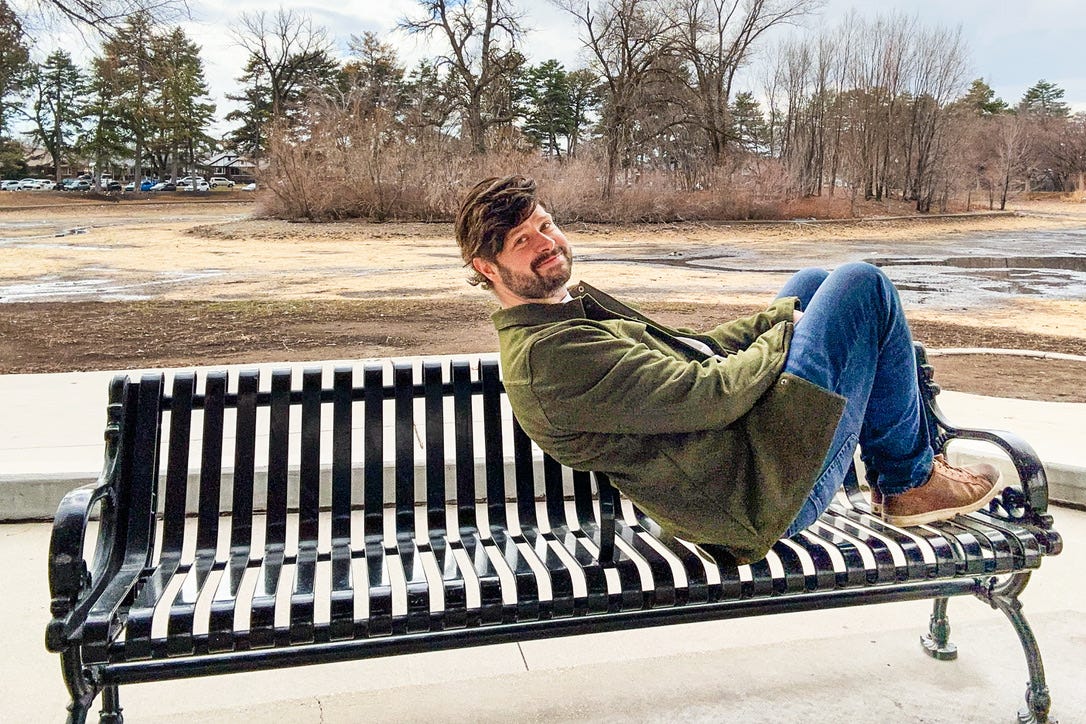The Newborn's Manifesto: Treating Your Existence As Non-Negotiable
Sudden. Disruptive. And holy as hell. The definition of aliveness.
Car 3 is cathedral-quiet.
Everyone absorbed in their phones, earbuds in, existing in separate bubbles of distraction. The train rocks in its familiar rhythm, that hypnotic sway that turns strangers into sleepwalkers, commutes into meditation.
Then a baby's cry.
Sharp. Piercing. Immediate.
The silence doesn't just break; it shatters. Heads turn. Eyes dart. The collective flinch of people whose peace has been interrupted.
She's young, early twenties maybe, with the particular exhaustion of new motherhood written in the set of her shoulders. The baby is maybe three months old, face red with the fury of being alive in a world that doesn't make sense yet. She bounces him gently, whispers apologies to no one in particular, her eyes scanning the car with that familiar shame of taking up too much space.
Watching her, I feel my jaw do that thing it does when I'm witnessing something I recognize but wish I didn't.
I've been practicing the art of preemptive shrinking for so long that I could teach a masterclass.
The baby keeps crying, and she keeps apologizing. I catch her eye and offer a small smile. Something in her posture softens.
"I'm sorry," she whispers. "He's usually good on trains. The motion puts him to sleep, but today..." She trails off, bouncing him faster.
"Don't apologize," I smile. "He's just announcing himself."
She looks up, surprised. "God, I've said sorry like twelve times in the last five minutes. To strangers. For having a baby." She laughs, but it's tired. "My mom keeps saying I need to get him on a schedule. That he shouldn't need this much."
The baby quiets for a moment, then starts up again. She doesn't flinch this time.
"You know what's weird? Last night I was lying there listening to him cry, and I thought... he's not asking if it's okay to need something. He just needs it." She looks down at him, something shifting in her voice. "When did I forget how to do that?"
The train hits a rough patch, and he fusses louder. An older woman across the aisle shoots us a look. The young mother catches it, and I watch her shoulders start to curl inward again.
"Everyone said babies are hard," she says quietly, more to herself than to me. "But nobody mentioned this part. How watching him just... need things without shame would make me feel so..." She trails off, looking down at him. "I don't know. Jealous, I guess?"
The Newborn's Manifesto
Here's what a three-month-old knows that I've forgotten: interruption is not the same thing as intrusion.
The baby isn't reading the room. He's not checking if this is a good time, if his needs align with the train's emotional temperature, if his hunger fits into anyone else's schedule.
He's hungry, so he announces it.
He's uncomfortable, so he reports it.
He treats his own experience as breaking news that requires immediate coverage.
We've convinced ourselves this is immaturity. But what if it's the opposite? What if spending your whole life checking if your needs are convenient for others is the real immaturity?
Adults are sophisticated enough to starve quietly. To suffer politely. To need things without mentioning them, want things without asking for them, hurt without making any noise about it. We call this consideration, but I think it's just elaborate performance art.
The baby is practicing something we've forgotten how to do: treating his own existence as non-negotiable.
I watch people scroll through their phones, pretending the crying isn't happening. This is our collective superpower: the ability to make uncomfortable truths invisible through sheer force of avoidance. We're all practicing the same magic trick—making our own needs disappear before anyone notices them.
But babies haven't learned this yet. They haven't figured out that wanting things is supposed to be embarrassing. That needing attention makes you high-maintenance. That expressing discomfort makes you difficult.
They're still operating from the radical assumption that their experience matters enough to mention out loud.
I think about the last time I expressed a need without apologizing for it first. The last time I said "I want this" instead of "I don't suppose there's any chance that maybe..." The last time I stated a boundary without building an escape hatch into the sentence.
I can't remember. Which is either very sad or the most honest thing I've admitted to myself all week. 😅
But what if the training is the tragedy? What if we're meant to remain a little bit newborn—urgent, honest, unashamed of our own aliveness?
The Beautiful Disruption
She shifts him to her other arm, and he settles against her chest. Around us, the car has adjusted to this new reality. Phones are away. People are actually looking at each other. The baby's cry broke something opens, and now there's more air in the room.
"Look at that," she says, noticing the same thing. "Five minutes ago everyone was pretending we didn't exist. Now..." She gestures at the woman who was glaring before, now watching with something that might be nostalgia. "He doesn't even know he's not supposed to make noise on trains."
I watch her face as she speaks, and I see someone discovering something about herself in real time. The way parenthood can crack you open to truths you've been avoiding for years.
"My mom keeps saying he needs to learn to self-soothe. But watching him..." She pauses, looking down at his face. "I keep thinking, what if we're the ones who forgot something? Like, when did needing help become this embarrassing thing?"
The train slows for her stop. She starts gathering her things with one hand, baby still against her chest.
"You know what I'm going to do?" she says, standing. "I'm going to stop saying sorry for him. He's three months old. Sorry for what? For being alive? For needing things?"
As she steps toward the door, I hear her talking to him, her voice different now, steadier: "Come on, baby. Let's go be loud somewhere else."
The Revolution of Refusing to Whisper
The doors close, and silence returns.
But I'm sitting here thinking about interruption versus intrusion, about the difference between taking up space and taking up the right to exist.
That baby just gave a masterclass in refusing to edit himself for public consumption. He didn't check the emotional temperature of the room before expressing his needs. He didn't wait for a more convenient moment to be hungry. He just was what he was, loudly and without apology.
When did we decide this was something to outgrow instead of something to protect?
We spend our whole lives learning to read rooms instead of changing them. Adapting to spaces that weren't designed for us instead of insisting on spaces that are. We become emotional contortionists, twisting ourselves into shapes that fit wherever we happen to find ourselves.
But here's what that young mother figured out in real time: apologizing for your existence doesn't make you more welcome. It just makes you smaller.
The train carries me toward whatever comes next, but I'm still hearing that cry. Not as noise, but as instruction. A three-month-old's masterclass in the art of being unashamed.
Maybe the revolution isn't learning to need less. Maybe it's remembering how to need things out loud.
Maybe maturity isn't about getting quieter. Maybe it's about getting braver about the noise you make.
Maybe the most radical thing you can do in a world that teaches you to whisper your needs is to let yourself be heard at full volume, without apology, without explanation, without the elaborate choreography of making your hunger convenient for everyone else.
The baby knew something I'm still (probably lifelong) learning: your needs aren't a negotiation. They're just information about what it means to be alive.
And maybe that's exactly the kind of noise the world needs more of—the sound of people who've stopped apologizing for taking up space and started claiming their right to exist in it.
Coming this Thursday
If you're tired of whispering your needs and ready to practice the art of being unashamed, this week's offering is for you.
On Thursday, I'll be sharing The Sound of Your Own Aliveness—a guided audio experience for paid subscribers. Think of it as meditation meets manifesto, a space to reconnect with the part of you that once knew how to need things without permission.
We'll explore what it feels like to let your voice take up space, to trust that your hunger is information rather than inconvenience.
What would change if you stopped treating your aliveness like an apology?
Throughout June, you can join for the year at 30% off—but the deeper question is: What would happen if you actually trusted the soup?
If the button doesn’t work (especially in the app), try this link: https://lifeasisee.com/af8c645f
About Alex
I’m Alex Lovell — political psychologist, yoga therapist, and writer.
Lived homeless. Been divorced. Survived a seven-car pileup with a semi. Fell in love with questions that don’t have easy answers. I’ve met a lot of thresholds. Even the one before death.
These days, I split my time between research, writing, and holding space for people figuring out who they are after everything shifted.
This Substack is where I make sense of things out loud.
I write for people in transition — between roles, beliefs, relationships, selves.
The ones quietly wondering, “What now?” but allergic to one-size-fits-all answers.
Sometimes I quote research. Sometimes I quote my own nervous system.
One speaks in data, the other in sensation. I’ve stopped choosing sides.
Free subscribers get weekly articles and insights (sometimes twice a week!). Paid subscribers get the Thursday Offerings, seasonal companion pages, post-nidra audio, and live slow sessions. Join me?
And if you are interested in upgrading to paid and would like to take advantage of the discount during June,’s the link to upgrade for 30% off for life!







Such a beautiful lesson for this young mother to realize at such a young age, for herself and her baby.
I think I was in my mid-forties when I learned to say "Thank You" instead of "I'm sorry." It took at least a year to unwind the habit of apologizing for everything. i don't know as I'm fully at the level of speaking my needs in full volume, but I am no longer apologizing for them. Instead, I'm thanking people for giving me the space to need.
I'm sitting over here a timezone away hoping that other people on the train overheard this conversation with the young mother and took in a few tidbits as well.
Hi Alex,
Another really great story. And gosh, early motherhood, I remember it well. Babies know how to express their needs and don't care one bit about doing it loudly. Mothers apologize quite a lot for what's perceived as bad behavior, when actually, many times it's likely normal for the infant or child. I don't think dads do this as much.
I think it's especially hard for women to get loud about what they want. We've been held down and held back for so long. Sure, things are way better now. But we're still taught the exact opposite - don't be too loud - figuratively and not. Be a good girl. All that sugar and spice nonsense.
For many of us, doing the opposite requires a real mindshift. Ours, but society's too. Being loud takes some guts, too.
At the very least, though, we can be loud in our own heads. State what we want. Boldly. Clearly. Unapologetically. To ourselves. That'd be a good starting point anyway.
Thanks for another insightful read. You always give me stuff to think about.